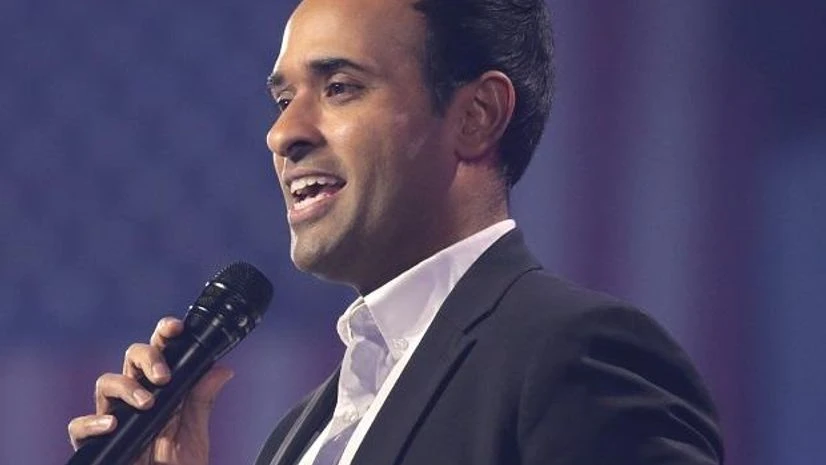Vivek Ramaswamy is an Indian-origin entrepreneur-turned-politician who is in the race for the 2024 Republican presidential nomination. Ramaswamy was born in Ohio to immigrant parents from India. While raised as a Hindu, he attended a Catholic high school and earned a biology degree from Harvard University before attending Yale Law School. He worked at a hedge fund before starting his own pharmaceutical company, Roivant Sciences, which made him a millionaire. In 2023, Forbes magazine estimated Ramaswamy's wealth to be around $630 million.
Background and education
Ramaswamy's parents came from South India to the United States before he was born in 1985. Growing up, Ramaswamy became an accomplished pianist, a nationally ranked tennis player, and the valedictorian of his Jesuit high school, according to a report by the New York Times (NYT).
Also Read
According to Ramaswamy, he had already made millions before graduating from Yale while working at a hedge fund. In 2014, he started Roivant Sciences, a company that bought patents for drugs yet to be fully developed from larger companies. Among this was an Alzheimer's drug that never reached the market. In 2021, he resigned as CEO of the company.
Shift to politics
Ramaswamy states that he considered himself a libertarian during his time at Harvard. He would even perform rap songs using the stage name "Da Vek". He performed some of his raps during his campaign that became popular on social media platforms.
Ramaswamy voted for libertarian in the 2004 presidential election but did not vote in 2008, 2012 or 2016, according to a report by Reuters. While he has contributed to both democratic and republican party candidates, in the 2020 elections he voted for former Republican President Donald Trump. He has also described himself as an American nationalist.
In 2021, he released his book, "Woke Inc.", establishing himself as a conservative. The book criticises "woke-ism" and significantly contributed to his popularity among conservatives.
Political views
Ramaswamy has been vocal about his stance against "woke-ism" and claims it has had a terrible influence on hard work, capitalism, religious faith, and patriotism - aspects he considers fundamental to the American identity.
He has also criticised big companies' business decisions based on social justice and climate change concepts. According to the NYT report, he believes companies' roles are to focus on generating profit and should not be concerned with issues of "public interest, such as reducing discrimination and pollution".
As far as policy is concerned, Ramaswamy opposes affirmative action, as they lower academic standards, and supports state-level abortion bans after six weeks, with exceptions for cases of rape, incest, and if the mother's life is in danger.
He also wants to expand the powers of the President and dismantle federal government authorities such as the Federal Bureau of Investigation (FBI), the Department of Education, and the Internal Revenue Service, which is responsible for tax collection.
He has opposed Ukraine's membership in the North Atlantic Treaty Organisation (Nato) and stated that Russia should be allowed to retain the region of Ukraine that it has already occupied. Moreover, according to the Reuters report, he said that Ukraine should make concessions to Russia to end the war.
Ramaswamy's campaign
Ramaswamy announced his presidential campaign in February and has gained momentum in the polls among conservatives. He ranking has moved between third and fourth position among republican nominees after Donald Trump and Ron DeSantis, respectively.
However, as a Hindu, he will have to secure the support of voters who are majorly Christian evangelicals. Ramaswamy has been a strong defender of Trump and has been spreading the message that the US is based on "Christian values" and "Judeo-Christian values". This combination does make him a unique republican candidate.
Indian-Americans divided over Ramaswamy?
Two out of the four Republican nominees are Indian-Americans. According to a report by the Hindustan Times, Indian-Americans make up about one per cent of the population in the US, accounting for 2.1 million voters. For the first time in history, the third-largest Asian-origin population, after Chinese and Filipino, are also making up one per cent of the US Congress.
This should be a proud moment for the population. However, Indian-Americans have largely been left-leaning, known for siding more with Democrats. While there has been a shift towards more conservative politics, many Indian-American voters appear to be concerned with both Ramaswamy's and Nikki Haley's positions on critical matters. They are especially concerned with Ramaswamy's promise to dismantle the Education Department, which has been vital to the success of many of the voters. Moreover, they are concerned with the Republican views on immigration, race, and identity. This has created a situation where Indian-American voters feel proud of their community's strides and are frustrated with the message they are sending.
According to Nate Silver's FiveThirtyEight, a political poll tracker, as off September 26, Donald Trump is maintaining his dominant lead ahead of the second debate (54.7 per cent), followed by Ron DeSantis (13.9 per cent). The next two candidates are Nikki Haley (six per cent) and Vivek Ramaswamy (5.9 per cent). Both are polling better than former VP Mike Pence (4.4 per cent), and former New Jersey Governor Chris Christie (three per cent), and South Carolina senator Tim Scott (2.8 per cent).

)
